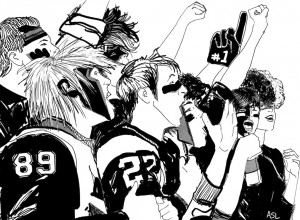Rage Against The Refs

Fans complained that replacement referees took too long to announce basic penalties, that they didn’t know which way to face to address the crowd, and that they couldn’t keep up with the pace of the game. But fans rarely complain about the home-team advantage that regular referees give teams, according to economist Tobias Moskowitz and sports journalist L. Jon Wertheim in their 2011 book, Scorecasting.
In a 2000 article in the European Journal of Social Psychology, social psychologists Michael Lupfer, Kelly Weeks and colleagues showed that most people judge fairness on the basis of consistency and predictability. Even though fans prefer good decisions, they may see bad or incorrect decisions as fair if referees are consistent. Fans get less upset when referees favor the home team because that’s something every home team counts on.
When fans saw replacement referees’ decision-making as inconsistent, unreliable, and biased, it made them feel cheated. For the duration of the lockout, their anger resonated throughout Twitter and Facebook. A controversial, last-second touchdown call that gave Seattle a win over Green Bay led to particularly scathing comments about the referees. One meme, for example, pictured Stevie Wonder next to the caption “Roses are Black, Violets are Black, Everything is Black, Touchdown Seahaws.”
Once the lockout ended last September, fans finally went back to the time-honored tradition of calling the referees blind–every other game.
